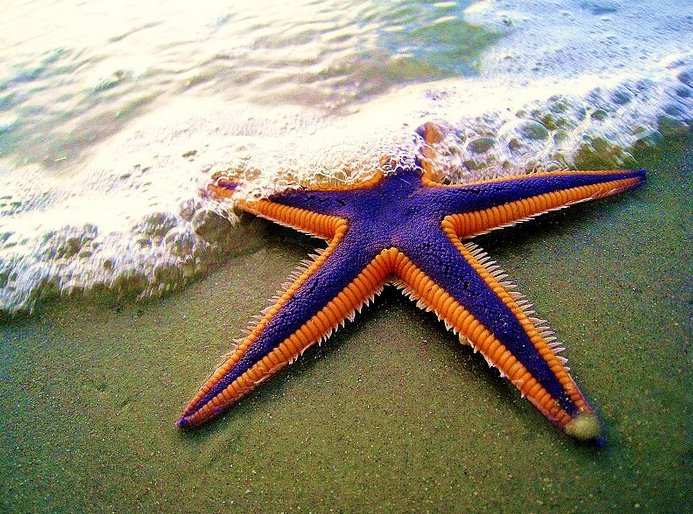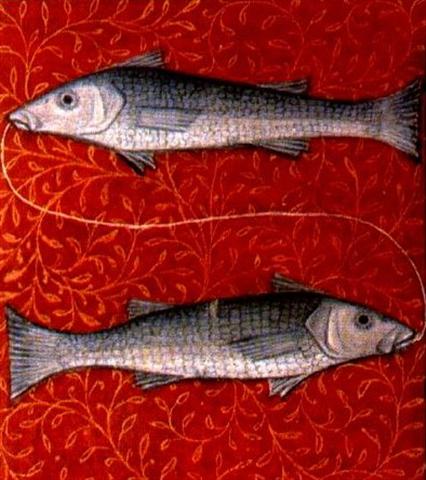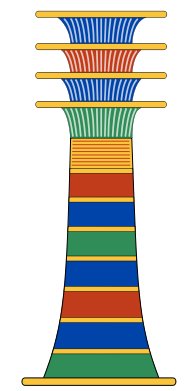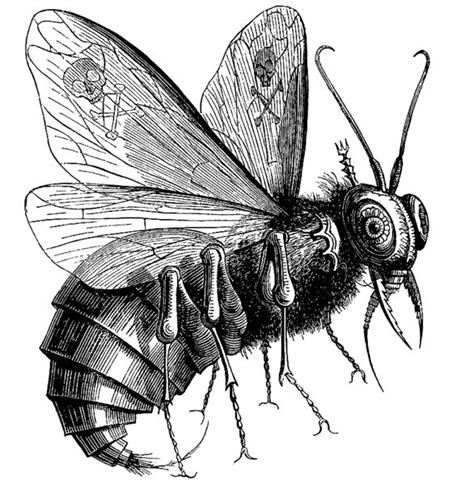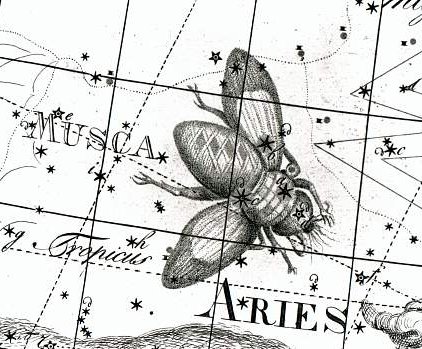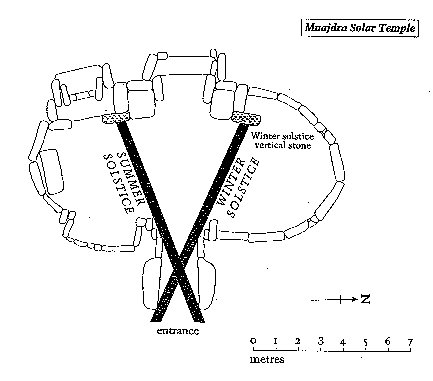16-4. Let's now document where the Full Moon ideally should have been:
One month after September 27 (273 = 3 * 91) was the place for day 300 = 118 + 182 = 4 * 29˝ + 2 * 91, and in the next night the Full Moon should ideally be observed at Musca Borealis:
The inoino (bad, bad) type of glyph seems to be the opposite of the maitaki (doublegood) type of glyph.
Eb6-21 may have been intended to allude to June 21, the day of solstice. Furthermore, there were 3 days needed to cover the asterism Musca Borealis, i.e. in a way creating 3 mata holes in the cosmic world wide web. These 3 'eyes' could represent a kupega net. However, in the light of daytime they might instead have perceived 4 dark mata, because 4 was an unlucky number and this seems to be illustrated on top of the belly of the Fly.
... Interestingly, since another meaning of shi is 'death', the number 4 is considered unlucky. For example, the floor numbering in hotels sometimes jumps mysteriously from 3 to 5; it's also considered unlucky to give four of something as a present ... Although on Easter Island, south of the equator, this would have been regarded as pure superstition because the rule was to avoid odd numbers: ... When I asked if I could bring one of the archaeologists along on the promised visit to his cave, Atan Atan was at first reluctant, but on second thought he found that this could do no harm since the cave was now mine and would be emptied anyhow. The objects, however, were to be taken directly on board the ship and not shown to anyone before we left the island. Whatever was said and done afterwards would not matter to him, he added. The stone skull with the peculiar pits on top brought to mind a small and crude stone cranium already found archaeologically behind the Vinapu temple plaza on the south side of the island, and a second examination of this piece showed much to our surprise that here also two deep pits had been carved on the forehead, asymmetrically on each side of the sagittalis ... Ferdon ... who conducted personal interrogations among the Easter Islanders in his own work team at Orongo, and who was to participate in the opening of Atan Atan's cave, wrote: 'I later learned from quite a different source that such depressions were for placing ground human bone to create maximum power for this key, or guardian stone.' Obviously, this was not an idea originating with Atan Atan and his cave. On March 18, the day preceding the nocturnal cave visit, I attended an Easter Island wedding in Hangaroa village. During the outdoor feast that followed I was approached by old Victoria Atan, Tahutahu, who grabbed my hand with both of hers and clung on to me, asking me with a friendly but most intense look to bring 'good luck' for herself and her family. It was not then quite clear what she meant, but next day it became evident as two of her nephews performed a rather ludicrous and bizarre rite made up for the occasion in the mess tent of our camp. Atan Atan and his brother Esteban had asked if they could come to us for a Norwegian meal for 'good luck'. They explained that later that night we were to eat from their own umu takapu, or ceremonial earth oven, which their aunt Tahutahu was to prepare in the neighborhood of the cave. Esteban Atan was brought along, said Atan, to make up an even number since I had asked to bring along my companion, Ferdon. An uneven number caused 'bad luck'. When I next asked for the participation even of the expedition photographer ... Atan Atan once more felt ill at ease, until again he made our number even: instead of sending away his brother he insisted that his brother's best friend, Henrique Teao, be brought with us also. The senior brother, Pedro Atan, was ill with influenza, but Henrique Teao was just then bringing along logs to our camp to serve as skids, as the group that had formerly erected the statue were now to reveal how these stone giants were transported. Henrique, who later drowned at sea with his friend Esteban Atan when they tried to escape from the island, had just then started to bring me secret sculptures, and it is not unlikely that the two Atan brothers were aware of the fact. Our Easter Island maid was relieved for the occasion by the ship's steward as our select little group sat down to a Scandinavian smörgaasbord and whispered about our secrets. The three islanders first made the sign of the cross and murmured a little grace, whereupon Atan Atan looked up and explained as if almost embarrassed, that this was otra cosa parte, 'something apart' from what was to follow. From then on all conversation continued in a hoarse whisper, and a special phrase composed in Rapanui by Atan Atan was to be repeatedly whispered by each of us as if to convince ourselves, if not the invisible aku-aku, that we were all related 'Long-ears' eating of a Norwegian curanto. As night fell, Atan Atan became visibly grave and solemn. When the six of us climbed into the expedition jeep to cross the island, beads of perspiration appeared on his face, and he repeatedly had to wipe them away although Ferdon and I, observing his emotions closely, agreed that the night air was anything but warm. By way of camouflage we filled the back of the jeep with bundles of washing to be delivered at the Vaitea sheep ranch, and further on near Hangaroa village we stole away from the jeep on foot. We left Henrique behind as a guard while we climbed a wall to cross a stony field that took us towards the part of the scattered village area where Esteban Atan lived. Atan Atan was now almost hysterical. He was terrified that someone might stumble and hurt himself and stated repeatedly that this would mean 'bad luck' for the enterprise. Frequently he reiterated that he was convinced we should have 'good luck' because he had always been kind to others so that his aku-aku was satisfied and no one had yet hurt himself on his land. Nevertheless he was visibly worried about the photographer, who was not a young man. He grabbed his arm and almost dragged him along. The photographer hung awkwardly onto Atan's shoulder as they both struggled to keep their balance across the boulder-strewn fields ... Instead of nighttime strings (i.e. the declination and right ascension lines forming the spiderweb for catching flying creatures such as stars → Canopy) the daytime units should be defined by bands (e.g. goathide thongs, februa) crossing over each other: ... In Plato's Timaeus, it is explained that the two bands that form the soul of the world cross each other like the letter Χ ... ... At the beginning of 44 B.C. - when Ceasar was still alive - the Senate decided to raise statues of him in all the temples and to sacrifice to him on his birthday in the month Quintilis, which in honour of him was renamed July. He was raised to the status of a god (among the other gods of the state) under the name Jupiter Julius. Marcus Antonius, who this year was consul together with Ceasar, became high priest and responsible for the ceremonies. In the middle of February, at the time of the old feast of Lupercalia, he ran around naked (except for a girdle), and whipped the Roman ladies with thongs made from goat-skin [februa], in order to promote their fertility ...
... Canopy ... covering over a throne, etc. XIV (Wycl.). Late ME. canope, canape - medL. canopeum baldacchino, for L. cōnōpēum, -eum, -ium net over a bed, pavilion - Gr. kōnōpeîon Egyptian bed with mosquito curtains, f. kōnōps gnat, mosquito ...
Anciently they counted down (for instance fingers) in contrast to the modern world of counting up. Although sometimes we are still counting down, for instance the number of nights remaining to Christmas. ... The practice of turning down the fingers, contrary to our practice, deserves notice, as perhaps explaining why sometimes savages are reported to be unable to count above four. The European holds up one finger, which he counts, the native counts those that are down and says 'four'. Two fingers held up, the native counting those that are down, calls 'three'; and so on until the white man, holding up five fingers, gives the native none turned down to count. The native is nunplussed, and the enquirer reports that savages can not count above four ...
...Then the big Fish did swallow
him, and he had done acts worthy of blame.
But We cast him forth on the naked
shore in a state of sickness,
|
|||||||||||||||||||||||||||||||||||||||||||||||||||||||||||||||||||||||||||||||||||||||||||||||||||||||||||||||||||||||||||||||||||||||||||||||

